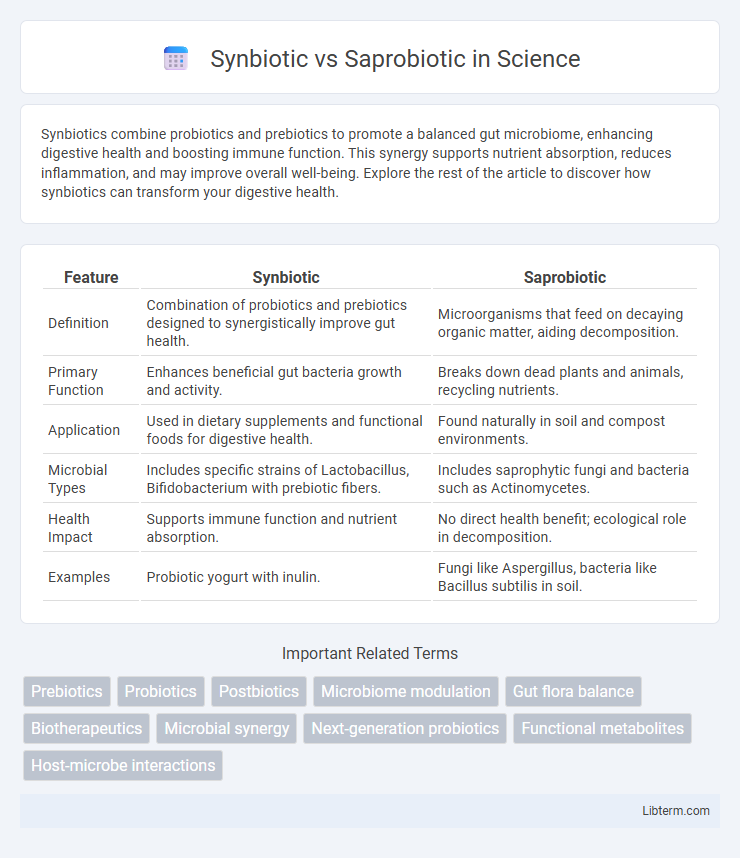Synbiotics combine probiotics and prebiotics to promote a balanced gut microbiome, enhancing digestive health and boosting immune function. This synergy supports nutrient absorption, reduces inflammation, and may improve overall well-being. Explore the rest of the article to discover how synbiotics can transform your digestive health.
Table of Comparison
| Feature | Synbiotic | Saprobiotic |
|---|---|---|
| Definition | Combination of probiotics and prebiotics designed to synergistically improve gut health. | Microorganisms that feed on decaying organic matter, aiding decomposition. |
| Primary Function | Enhances beneficial gut bacteria growth and activity. | Breaks down dead plants and animals, recycling nutrients. |
| Application | Used in dietary supplements and functional foods for digestive health. | Found naturally in soil and compost environments. |
| Microbial Types | Includes specific strains of Lactobacillus, Bifidobacterium with prebiotic fibers. | Includes saprophytic fungi and bacteria such as Actinomycetes. |
| Health Impact | Supports immune function and nutrient absorption. | No direct health benefit; ecological role in decomposition. |
| Examples | Probiotic yogurt with inulin. | Fungi like Aspergillus, bacteria like Bacillus subtilis in soil. |
Introduction to Synbiotics and Saprobiotics
Synbiotics combine probiotics and prebiotics to enhance gut microbiota balance and improve digestive health by promoting beneficial bacterial growth. Saprobiotics, on the other hand, function through natural fermentation processes involving saprophytic microbes that break down organic matter, aiding in nutrient absorption and immune regulation. Both play crucial roles in microbiome modulation but operate via distinct mechanisms and applications in health sciences.
Defining Synbiotics: Components and Function
Synbiotics are a combination of probiotics and prebiotics designed to synergistically improve gut health by enhancing the survival and activity of beneficial microorganisms in the digestive system. Probiotics are live beneficial bacteria, while prebiotics are non-digestible fibers that serve as food for these bacteria, promoting their growth and activity. The primary function of synbiotics is to restore and maintain a balanced gut microbiota, improving digestion, immune response, and overall intestinal health.
Understanding Saprobiotics: Nature and Mechanisms
Saprobiotics are microorganisms that derive nutrients by decomposing organic matter, playing a vital role in nutrient cycling and soil health. Unlike synbiotics, which combine probiotics and prebiotics to enhance gut microbiota, saprobiotics function by breaking down dead organic material through enzymatic activity, contributing to ecosystem sustainability. Understanding saprobiotics involves studying their metabolic pathways and interactions with environmental substrates to optimize their use in agriculture and waste management.
Key Differences Between Synbiotics and Saprobiotics
Synbiotics combine probiotics and prebiotics to enhance gut microbiota health by promoting beneficial bacterial growth, whereas saprobiotics rely on decomposing organic matter to obtain nutrients without directly influencing gut flora. Synbiotics actively improve digestive balance and immune function by supplying live microorganisms and their substrates, while saprobiotics function primarily in environmental nutrient recycling through organic matter breakdown. The key difference lies in synbiotics' targeted gut health benefits versus saprobiotics' ecological role in organic decay.
Health Benefits of Synbiotics
Synbiotics combine probiotics and prebiotics to enhance gut microbiota balance more effectively than saprobiotics, which primarily deal with organic matter decomposition. Synbiotics promote improved digestion, enhanced immune function, and reduced inflammation by supporting beneficial bacterial growth and activity in the gastrointestinal tract. Clinical studies link synbiotic supplementation to better outcomes in irritable bowel syndrome, metabolic disorders, and overall gut health maintenance.
Health Benefits of Saprobiotics
Saprobiotics promote gut health by enhancing the population of beneficial bacteria that naturally decompose organic matter, aiding digestion and supporting immune function. Unlike synbiotics, which combine probiotics and prebiotics, saprobiotics work by metabolizing complex substrates in the gut, producing vital enzymes and short-chain fatty acids that reduce inflammation. Their unique ability to maintain microbial balance and improve nutrient absorption makes saprobiotics a valuable component in managing digestive disorders and overall wellness.
Scientific Research and Evidence: Synbiotics vs Saprobiotics
Scientific research on synbiotics--combining probiotics and prebiotics--demonstrates enhanced gut microbiota modulation and improved metabolic health markers compared to probiotics or prebiotics alone. Emerging studies on saprobiotics, which thrive on decomposing organic matter, focus on their ecological role rather than direct gut health benefits, with limited clinical evidence supporting human health effects. Comparative analyses highlight synbiotics' potential in clinical nutrition, while saprobiotics remain primarily relevant in environmental and agricultural microbiology contexts.
Practical Applications and Dietary Sources
Synbiotics combine probiotics and prebiotics to enhance gut health by promoting beneficial microbial growth, commonly found in fermented foods like yogurt and dietary fibers such as inulin from chicory root. Saprobiotics, which involve decomposer microbes, play a crucial role in waste decomposition and nutrient cycling, primarily applied in environmental bioremediation and composting processes rather than dietary consumption. Practical applications of synbiotics target improved digestive health and immune function, while saprobiotics are leveraged for sustainable waste management and soil fertility enhancement.
Safety, Dosage, and Potential Side Effects
Synbiotics combine probiotics and prebiotics to enhance gut health, generally deemed safe with recommended dosages typically ranging from 1 to 10 billion CFUs per day; side effects may include mild digestive upset such as bloating or gas. Saprobiotics, involving microorganisms that decompose organic matter, have limited direct human application, and safety data is sparse, necessitating careful evaluation before use. Ensuring correct dosage and monitoring for adverse reactions is crucial in both cases to minimize potential side effects and maximize therapeutic benefits.
Choosing the Right Supplement: Synbiotic or Saprobiotic?
Choosing the right supplement depends on your gut health goals; synbiotics combine probiotics and prebiotics to enhance beneficial bacteria growth, while saprobiotics focus on enzymes and fiber to support digestive function and nutrient absorption. Synbiotics are ideal for restoring microbial balance and improving immune response, whereas saprobiotics target the breakdown of waste and detoxification processes. Assess your specific digestive needs and consult healthcare professionals to determine whether a synbiotic or saprobiotic supplement will provide the most effective support.
Synbiotic Infographic

 libterm.com
libterm.com